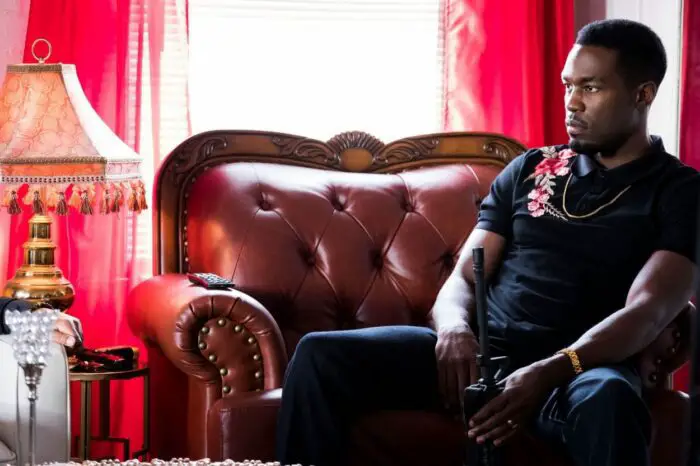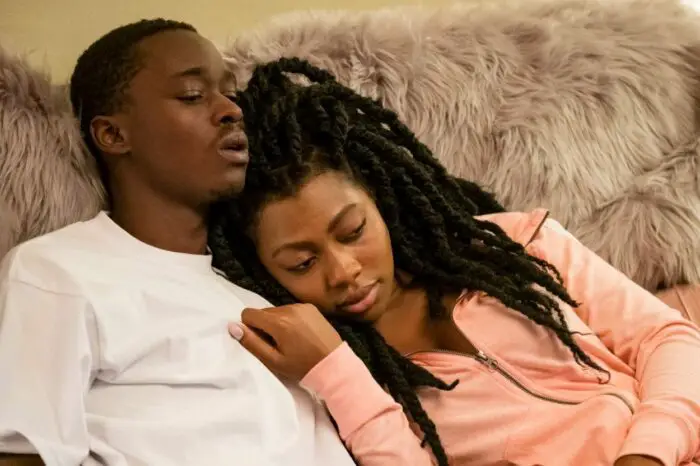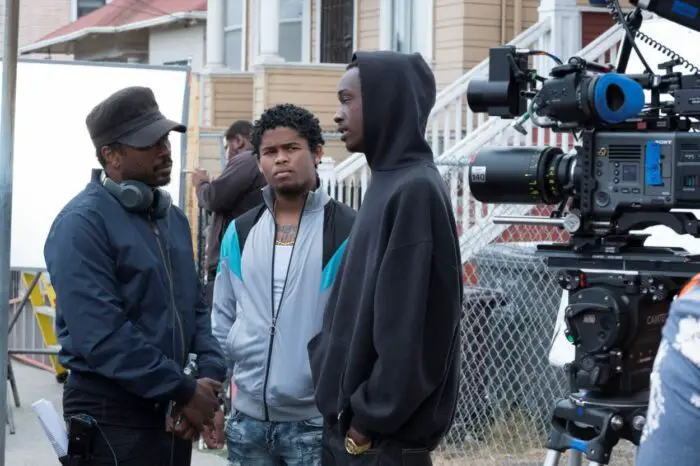In the opening scene of All Day and a Night, Ashton Sanders’ lead character Jahkor stands coldly and defiantly in front of a man named Malcolm with two pistols trained on him. He asks his target “You remember me?” That question is Jahkor’s only hesitation before pulling the trigger and murdering two people. He is painted as remorseless in the trial and prison sentencing that quickly follow.
At no point does Jahkor offer reasoning. Far later in the film, when it is revealed who Malcolm was and why Jahkor asked that fateful question with coiled resolve, you see and understand something that will elicit an exhaling sigh and a chin rub in dismay. That sorrow comes from grasping a cycle of repercussions completing a vicious circle built over generations. Writer/director Joe Robert Cole fearlessly presents more than a crime movie and far more than some “thug” film. It is a severe testament to the hardship of this Oakland setting and the lives existing within it.
All Day and a Night orbits this not-so Bright Side of the Bay during three periods of time for Jahkor Abraham Lincoln. The present follows his incarceration in prison among a yard of would-be rivals and allies, including his own downtrodden father J.D., played by the incomparable Jeffrey Wright. The second goes back a little over a year before the crime when the musically-minded and expectant father Jahkor and his violent partner TQ (Isaiah John) began to align themselves with the influential local gang leader Big Stunna (Yahya Abdul-Mateen II of Aquaman and the upcoming Candyman). The third goes back to Jah as a middle school kid (All-American’s Jalyn Hall) when the shattered innocence that would forge his adult anger emanates from the failed parenting of J.D. and his mother Delanda (TV star Kelly Jenrette).

In each chronological layer of All Day and a Night, we bear witness to a subculture fraught with violence and vices. As one of Ashton Sanders’ many effective voiceovers laments “slavery taught black people how to survive, not how to live.” This indeed is not living. This is a time and a place of hit-first, rampant poverty, unchecked physical abuses, and shared mental anguishes manifesting in many forms and lasting seemingly endless durations. This is survival in urban destitution. In another narration, his Jahkor laments “when violence is all around you, you get used to it.”
Many have seen this benumbed tone of Ashton Sanders before in the Oscar-winning Moonlight. Four years has added fullness and density to his screen presence and potential for that same stature. His low gravel of vocalizations and his stinginess with smiles is tranquilizing and crushing at the same time. When cinematographer Jessica Lee Gagne holds on his face, the stress and tragedy are palpable. Another type of actor would make this a louder and showier pulpit for putting rage at the forefront of Jahkor. Sanders has an innate steely restraint that if or when his character does lash out, it is more a consummation of emotions than some flagrant display for shock or awe. This young man continues to be all kinds of impressive.
What does expand life in this setting is a level of loyalty that is more adherence than integrity. Loyalty is currency. Unconnected individuals must either know their lane or their “soil” or join one. There is a tiered and limiting nature to the pipe dreams of supposed choices and options that poorly substitute for equity that make up not only a community way but, sadly, an American one (you heard that label right, because we have to own this).

In this film’s flashbacks, there are touchpoints that count as possible turning points for Jahkor. Dismally, there is a bleak honesty to this narrative when even the brightest hope will not matter. All Day and a Night goes beyond a simple parallel akin to some “sins of the father” parable. It frames the repetitive consequences of these desperate livelihoods, including generational ethnic incarceration of black men, as known and inevitable. The omnipresent narration strikes again to state “we were born in prison, but I am not your prisoner,” demonstrating the desired indignation to push back against these recurrent fates.
Make no mistake, there’s no hero to be found in All Day and a Night. You have a scorned and scarred man in Jahkor who, unlike wishful movie stereotypes built for the mirage of happy endings, is rightfully, instead of wrongfully, imprisoned. His sins are real. His consequences are earned. The all-important “why” echoing from that opening assassination does not make motive or answers fair or any easier to endure. To empathize more than chastise will be a mighty challenge for many.

Reaching those bold heights of bracing social commentary, it is fair and complimentary to call Joe Robert Cole’s movie more important than entertaining. Mark that goal as accomplished. Guided by a subdued underscore from Us composer Michael Abels and a small array of diegetic music, the Black Panther co-writer uses not a drop of sugarcoating in his first directorial effort in nine years. The brutality against the hearts in All Day and a Night hurts more than harm subjected to any flesh. In that regard, it is also fair to question the place and mentality of this movie’s bravery during a current civil climate where negative racial examples do not need more perpetuation. That is an uphill battle without a welcoming core to embrace. However, whoever said life or movies needed to play nice?



